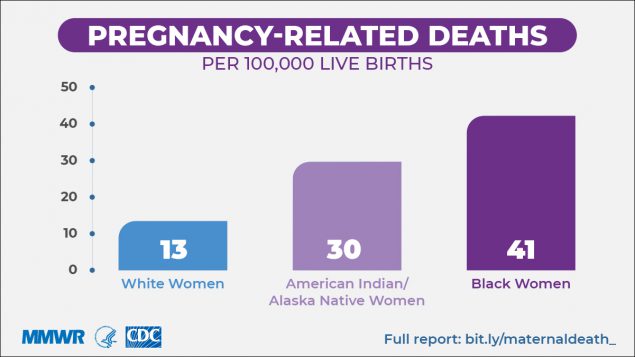A Disproportionate Number Of Black Mothers Are Dying In The Hands Of The Healthcare System
As we come together as a nation and begin dismantling the grips of systemic racism, it is becoming increasingly important to evaluate ALL areas in which such injustices still exist. One surprising domain that continues to perpetuate racially-biased despair subsists within the walls of our hospitals. This inequity is made evident by the alarming rate in which black mothers die while giving birth.
Although black women have the worst maternal mortality outcomes in America, our country as a whole exhibits an abysmally high maternal and infant mortality rate, especially when contrasted against other developed nations of equal wealth.
According to a report released by the CDC’s National Vital Statistics System, the 2018 maternal mortality rate was 17.4 maternal deaths per 100,000 live births. This means that 658 women died from pregnancy-related complications in America during 2018 alone. When these numbers are compared globally, the United States ranks extremely low in maternal health outcomes; 55th- falling just behind Russia which ranks at 54th.
In an interview with The New York Times, Dr. Anne Schuchat, Principal Deputy Director of the CDC, stated the following in regards to this maternal healthcare crisis:
“The bottom line is that too many women are dying largely preventable deaths associated with their pregnancy. We have the means to identify and close gaps in the care they receive. While not all of the deaths can be prevented, we can and should do more.”
Although maternal and infant mortality affects women of every demographic, black women have been statistically shown to be at a higher risk. According to the CDC, black women are 3.2 times more likely to die during childbirth or from pregnancy-related complications than their white counterparts, which is clearly reflected by data collected between the years 2007-2016.
The catalyst to the skyrocketing maternal mortality rates in the United States often involves preventable obstetric complications that occur during pregnancy, at the time of delivery, or within the first 42 days following birth. Some of the most prevalent conditions that lead to compromised maternal and infant health outcomes include severe bleeding at the time of delivery, complications related to high blood pressure, cardiovascular disease, and stroke.
But why are black women at a higher risk of dying from pregnancy-related complications that affect all women? One argument is that black women often receive lesser-quality prenatal care than white women, are more likely to be uninsured, and aren’t treated with dignity and respect when enduring pain or exhibiting other health concerns. This gap in the quality of care they receive is due to harmful stereotypes that both consciously and subconsciously dictate how medical professionals interpret the mannerisms of black women and gauge the urgency of a medical concern.
Steps Toward A Solution
The following steps were directly sourced from the Centers Of American Progress and details what steps must be taken by research and healthcare providers to bridge the gap in these maternal healthcare disparities:
- “Improve access to critical services:
- Strengthen existing health programs and support reproductive health care.
- Screen and treat women at risk for preterm birth.
- Eliminate maternity care deserts.
- Offer African American women tools to navigate the health care system.
- Improve the quality of care provided to pregnant women:
- Train providers to address racism and build a more diverse health care workforce.
- Create standardized assessments for mothers and infants.
- Adopt new models of care and link payment to quality.
- Address maternal and infant mental health:
- Identify barriers to accessing maternal mental health services.
- Dismantle care barriers with a comprehensive approach.
- Screen for and address infant and early childhood mental health issues.
- Enhance supports for families before and after birth:
- Invest in and expand access to policies and programs that support families’ basic needs.
- Invest in community programs that offer one-stop comprehensive services.
- Simplify enrollment across public benefit programs.
- Invest in home visiting.
- Fund community-based education and communications initiatives to support families.
- Improve data collection and oversight:
- Standardize birth and death certificate data.
- Mandate and fund fetal and infant mortality review committees.
- Ensure equity in the review process”
Although we still have a long way to go in dismantling the systemic racism that is embedded within our healthcare system, together, we can strive to make America a safer place to give birth- for all mothers.


I don’t normally do reviews but I have to tell everyone about Latched Mamma products. I purchased a sports bra that felt like silk and fit perfectly. I also got the Mamma bear t-shirt, same thing, fits perfect and feels so soft against my skin. I like that the shirts feel thick and they’re easy to use. I feel like I will be able to nurse anywhere. Thank you for making such a great, affordable product.